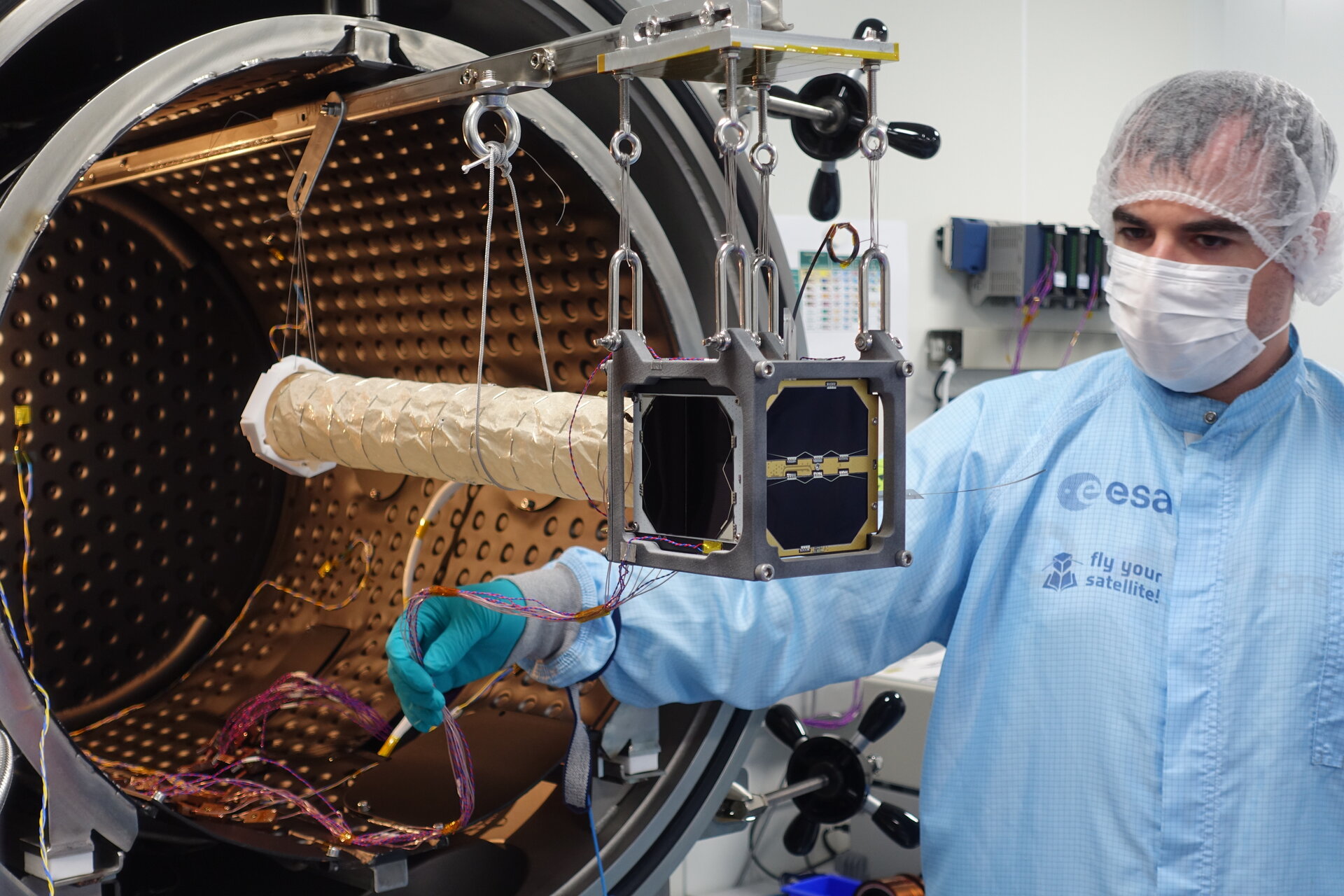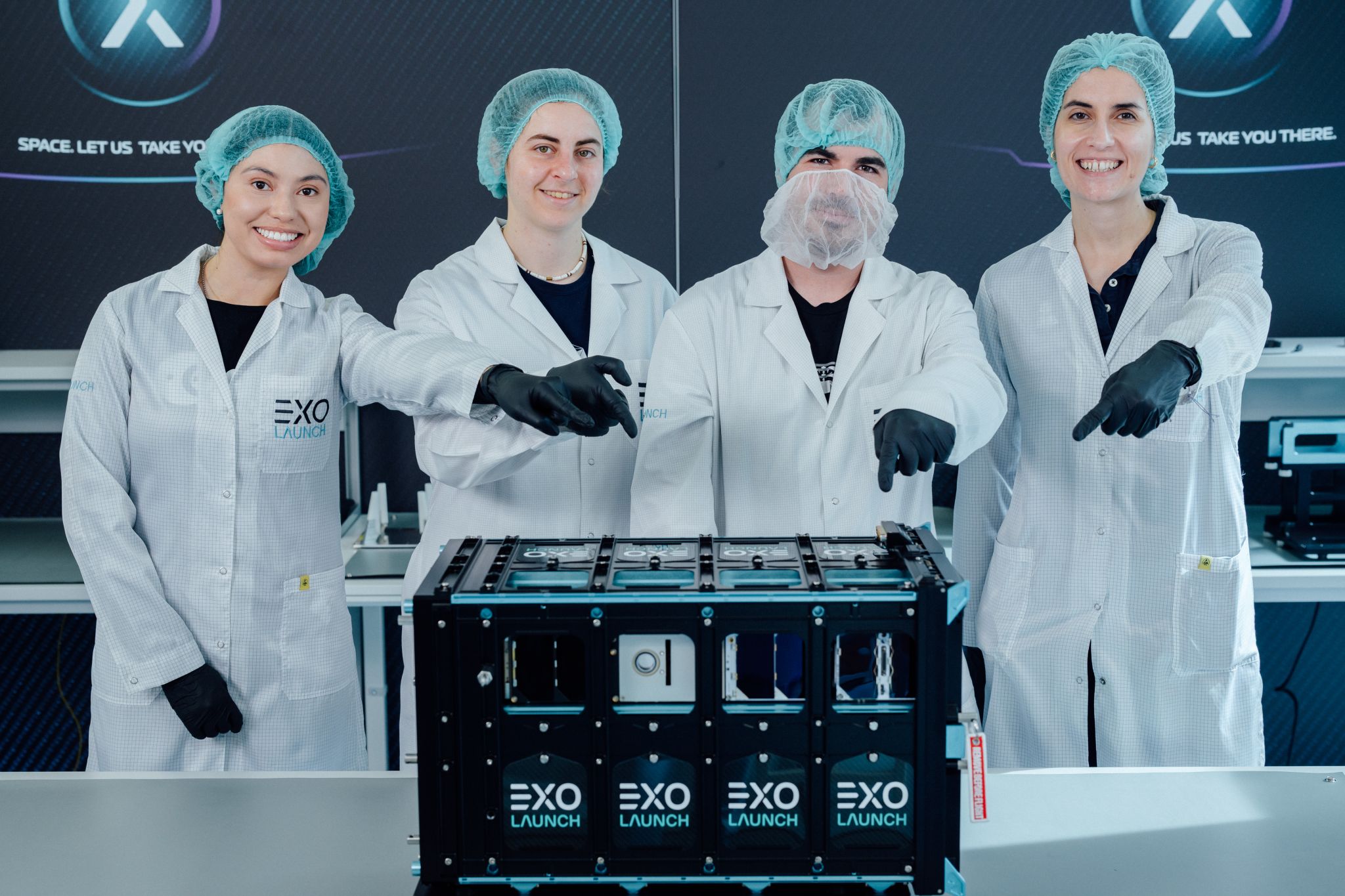A new nanosatellite of the Universitat Politècnica de Catalunya ready to launch into space on Ariane 6
- The ³Cat-4 nanosatellite will be one of seven payloads on the Ariane 6 maiden flight scheduled for today, 9 July
- ³Cat-4 is the only Catalan instrument and one of two from Spain on board this European Space Agency’s mission
- Developed by students of UPC NanoSat Lab, which has the collaboration of the IEEC, the nanosatellite focuses on observing the Earth and studying weather and climatic phenomena, among others

Caption: The student Luis Contreras during one of the tests conducted with ³Cat-4 at ESA facilities.
Credits: ESA.
The European Space Agency‘s (ESA) Ariane 6 rocket will be launched from Europe’s Spaceport in Kourou, French Guiana, today, between 8 p.m. (CEST) and midnight (6 p.m. – 10 p.m. UTC). ³Cat-4 (read “cube-cat-four”) is on board to go into orbit. This is the fifth nanosatellite created by the NanoSat Lab of the Universitat Politècnica de Catalunya – BarcelonaTech (UPC), a laboratory within the Department of Signal Theory and Communications, linked to the Barcelona School of Telecommunications Engineering (ETSETB), and with the support of the Institute of Space Studies of Catalonia (IEEC — Institut d’Estudis Espacials de Catalunya).
It is a 1-unit CubeSat-type nanosatellite and it was selected to be launched aboard the rocket along with a satellite from Galicia and other payloads from Germany, Slovakia, France and Portugal. This selection followed ESA’s announcement of opportunity, which offered a launch to low Earth orbit for experiments up to a total mass of 80 kg and release of payloads with a combined mass of up to 800 kg.
³Cat-4 aims to measure weather and climatic phenomena from space using a GPS and Galileo navigation signal reflectometer (GNSS-R) and a microwave radiometer developed by students, and to observe the Earth to monitor ice and soil moisture. Also, to locate and track vessels to prevent accidents and to study interferences in the frequency range to be used.
All this with experimental technology entirely designed at the UPC and a new deployable antenna. Once in orbit, the antenna will perform some of the measurements required: radiometric data and data aimed at mitigating radio frequency interferences using a GPS and the GNSS-R instrument.
³Cat-4 is part of the CubeCat (³Cat) series of small satellites and payloads that have flown or will fly into space with missions developed entirely by students and faculty at the NanoSat Lab, directed by UPC professor and IEEC member Adriano Camps.
Seven years of work by more than ninety undergraduate, master’s and doctoral students
The nanosatellite is part of the ESA’s Fly Your Satellite! programme, which gives university students the opportunity to design, build and launch their own satellites into orbit.
Designing, building and testing ³Cat-4 has involved more than 90 bachelor’s degree, master’s degree and doctoral degree students from several disciplines over seven years. Three of these students recently visited the Kourou spaceport to perform the final checks: the definitive integration of the EXOpod Nova module (with ³Cat-4 inside) with Ariane 6.
Back in March, a part of the team travelled to Berlin, Germany, to complete the previous integration of ³Cat-4 with the EXOpod Nova module.

Caption: From left to right: Nataly Buitrago (one of the team leaders), Júlia Alós and Luis Contreras (the other team leader), with the mission coordinator at Fly Your Satellite!, Cristina del Castillo, during the pre-launch tests in Berlin (Germany).
Credits: Exolaunch.
Two members of the team will be present at the launch site of Ariane 6, operated by Arianespace in French Guiana: Luis Contreras—a systems engineer, a student on the UPC’s doctoral degree in Aerospace Science and Technology, and team leader—and Júlia Alós—a student on the master’s degree in Telecommunications Engineering at the ETSETB.
Contacts
IEEC Communication Office
Castelldefels, Barcelona
E-mail: comunicacio@ieec.cat
Lead Researcher at the IEEC
Castelldefels, Barcelona
Adriano Camps
Institute of Space Studies of Catalonia (IEEC)
Universitat Politècnica de Catalunya – BarcelonaTech (UPC)
E-mail: camps@ieec.cat, camps@tsc.upc.edu
About the IEEC
The Institute of Space Studies of Catalonia (IEEC — Institut d’Estudis Espacials de Catalunya) promotes and coordinates space research and technology development in Catalonia for the benefit of society. IEEC fosters collaborations both locally and worldwide and is an efficient agent of knowledge, innovation and technology transfer. As a result of more than 25 years of high-quality research, done in collaboration with major international organisations, IEEC ranks among the best international research centres, focusing on areas such as: astrophysics, cosmology, planetary science, and Earth Observation. IEEC’s engineering division develops instrumentation for ground- and space-based projects, and has extensive experience in working with private or public organisations from the aerospace and other innovation sectors.
The IEEC is a non-profit public sector foundation that was established in February 1996. It has a Board of Trustees composed of the Generalitat de Catalunya, Universitat de Barcelona (UB), Universitat Autònoma de Barcelona (UAB), Universitat Politècnica de Catalunya · BarcelonaTech (UPC), and the Spanish Research Council (CSIC). The IEEC is also a CERCA centre.
